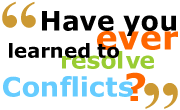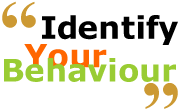
Why do we fight?
Is it maybe because the makeup sex is so good afterward?
Are you the type of person who loves to argue, shout and even end up in a furious rage?
Or are you more the type who shrinks into your shell, avoiding conflict at all costs?
Either way, you'd need some readjusting.
Will this article help you to learn how to resolve conflicts the healthy way? You bet!
We all know and fear those particular situations when conflict occurs, and things are getting out of hand.
The mere word “conflict” invokes negative associations of fighting, arguing, withdrawal, fear, anger, hurt and loneliness.
On the other hand, relationship conflicts can open a path to mutual understanding and personal growth.
There are so-called conflict resolution strategies for couples.
So conflict can be a good thing.
We have all met couples, who proudly proclaim that they have never had a single quarrel in their relationship … like ever.
Apart from the fact that this is very unlikely, it is also very unhealthy.
No one can tell me that a happy and fulfilling relationship is one without conflicts.
If there aren't any, then something is wrong.
It usually means that someone is holding back their needs and trying hard to please the partner at all cost.
Needless to say, it's only a matter of time when the bomb explodes.
A conflict is the most challenging thing to occur in a relationship.
The only key to profit from it is to use verbal or nonverbal communication for conflict resolution.
By resolving disagreements and conflicts quickly and most importantly painlessly, your trust in each other will flourish.
In other words: an argument is good if you learn how to do this!
The classic example of adverse positions when conflicts occur is the “rage-withdraw” opposition. Some react to conflicts with explosive rage, others freeze and withdraw.
Why is that so?
It all depends on how you have learned and experienced conflict resolving in your early childhood.
What childhood experiences influence your ability to resolve conflicts in a negative way?
If you have lived in a family where anger and frustration were taken out on you, and you grew up with feeling angry and fearful of conflict, you will most likely numb your feelings and perhaps fail to recognize your longing for closeness and tenderness.
Or you will simply react explosively and angrily.
On the other hand, if you learned in your family to resolve differences without humiliation or punishing, and that disagreement led to compromises, then you will later resolve your conflicts in a calm and productive way.
And more important: will stay true to yourself AND your feelings at the same time.
But how can you burst your early childhood bonds?
 The only way is to recognize your behavior and then correct it – over and over again.
The only way is to recognize your behavior and then correct it – over and over again.
This is called building new neurological pathways.
There is no other way around doing this – and no magic pill. Unfortunately.
The first step is to identify your conflict behavior patterns.
What do you do and how do you react during those conflicts?
Once you are aware of your reaction, you can then connect this knowledge with your early childhood behavior.
The last step would be of course to consciously alter your pattern to a newer better one.
But what is a better pattern in conflict resolution strategies, you might ask?
Apparently verbal and nonverbal communication skills are the main keys to resolving conflicts.
Here are some of these communication skills in short:
- Be focused and stay calm in intense situations.
This is the most important skill. If you are able to stay calm and centered no matter how intense the conflict may be, then you can guarantee that the situation will not escalate. - Always know what matters most to you and be able to experience intense emotions.
Never numb these basic feelings like sadness, fear or anger, this will compromise your ability to face and resolve differences. - Know how to recognize and read nonverbal cues.
Facial expressions, eye contacts, voice tone, posture. Knowing these can help to avoid conflicts before they occur. - Be playful and know when and when not to apply humor in conflict situations.
Many dangerous situations in a relationship can be avoided by using humor at the right moment.
The importance of personal needs:
If you ignore your personal needs, they will most certainly turn up unexpectedly.
It's also possible that they will manifest in other ways, like for example in illness.
Ignoring each other's needs can lead to serious relationship problems. Everyone has the desire to feel understood and supported by their partner.
Learning to respect and realize each the needs is one of the most important premises of a healthy relationship.
How to avoid conflicts by recognizing your needs:
- Acknowledge the legitimacy your partners and your own needs.
This will open up limitless possibilities for solving problems. - Identify your and your partner’s needs correctly.
Only then you will be able to work out a compromise that will content you both. Be aware that misunderstanding your partner’s needs endanger your relationship. - Speak openly with one another about your needs, and more important, share your feelings about them.
Never hold anything back. Eventually, it would only come back on you. - Always try to work out a compromise
Know that it's impossible to resolve a situation without compromising, if the needs are different. Every other way will lead to conflict. Learn to be a diplomat.
 Conclusion:
Conclusion:
Solving relationship conflicts and learning strategies is something that can be learned.
If your childhood has provided you with the proper mindset towards conflict, then great.
If not, you have to learn it.
The problem is that most people don't recognize their behavior and they don't know where it's coming from.
You have to watch your own behavior and correct it consciously. Don't be a slave to your childhood experiences.
The lack of understanding about differing needs in a relationship and the inability to compromise is one of the most common reasons for break-ups or divorces.
Conflicts are good, as I said, once you have learned to profit from them and not fear them, you can elevate your relationship to a higher level.
I wish you happy and healthy fights.
Your friend,
Eddie Corbano

Thank you for this valuable insight “Conflict Resolution Strategies – For Better Fighting”. The information was eye-opening. I walk away from this with a gem of knowledge that I did not have before. Thank you.